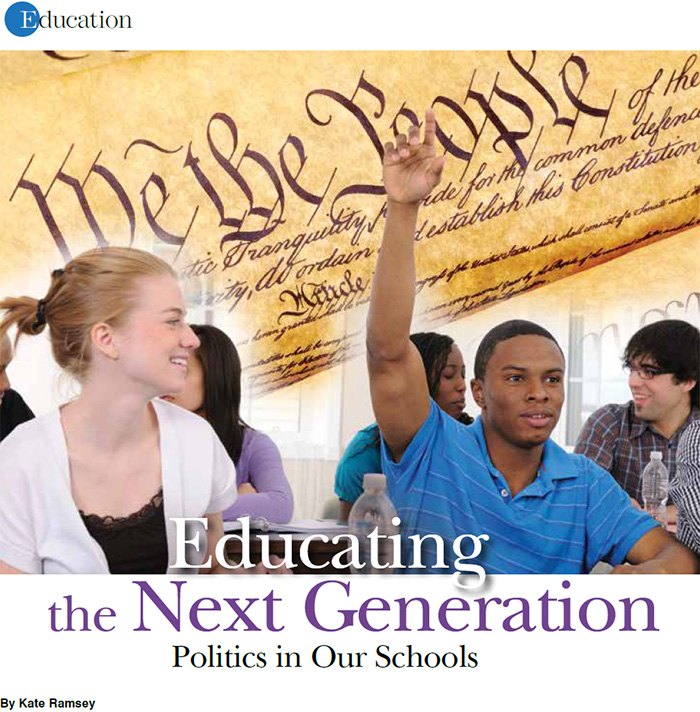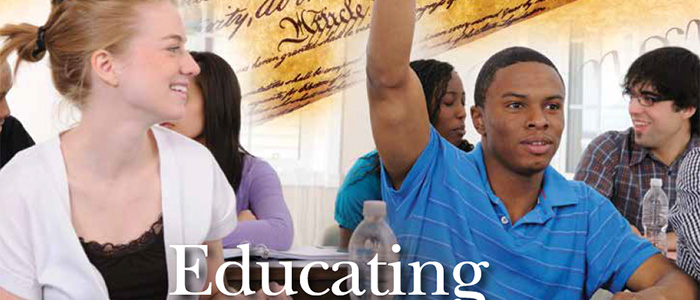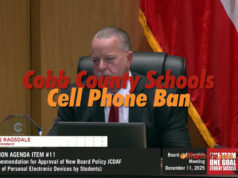
Students in both the Cobb County School District and Marietta City Schools begin learning about American government and its inner workings at a very early age. Beginning with basic education and advancing to more complex information as the grade level increases, students are provided with a “stair stepping” form of education, which allows them to continually build upon what they’ve learned in the previous year or course. The courses begin at the elementary level and continue to expand with more in-depth concepts as the students move through the units.
The Cobb County School District website states that their efforts of “ensuring that all Cobb students are historically, geographically, politically and economically literate,” begin by placing the students in an educational setting “where six year olds learn about our country’s patriotic symbols and holidays.” Upon this primary exposure to fundamental knowledge of what the United States of America was built from, students steadily expand their knowledge of the country they live in and are introduced to more involved information and pieces of history.
In the Classroom
Trudy Delhey, Cobb Schools’ Social Studies curriculum supervisor for grades six through 12, explains that in grades six through eight, there are units taught that deal specifically with government. “In sixth and seventh grades, there is more of a world studies perspective, looking at different parts of the world,” Delhey says. “In sixth grade, [students] are looking at different forms of government internationally … how the citizens are involved and autocratic and democratic governments. The middle school grades are actually covering some pretty heavy stuff there.”
Delhey goes on to say that the eighth-grade unit is a course on Georgia studies, where students learn about the role of citizens under the Georgia Constitution, the separation of powers and the rights and responsibilities we have as citizens. She says they also discuss voting qualifications, the structure of our state government and the Georgia General Assembly.
Students in the 11th-grade course, which is titled U.S. History, focus on the founding principles of the American government, with a perspective of historical issues involving the government throughout the years. The students learn about the various decades and issues posed involving the government during those times; this course includes education on state and federal rights and civil rights.
Katie Ault, a junior at Marietta High School, says her teacher “takes an exciting current events approach to helping [students] understand politics. “For every aspect of the political system we discuss, [my teacher] relates it to those who are currently in office or issues the country is currently facing,” Ault says. “For example, when learning about the organization of Congress, we researched not only the leadership positions and responsibilities within Congress but also the personal lives and decisions of our current Senators and Representatives.”
Ault explains that this form of teaching increases a student’s interest in government because the student “can understand the political process through concepts and circumstances that we see elsewhere in our daily lives.”
“Eighth-grade students look at the same things students in grade 12 look at, except the grade 12 students look at it from a national perspective,” Delhey adds.
In 12th grade, the American Government course educates seniors on all points of how the U.S. Government functions. There is an emphasis on elections and voting and the philosophies that shaped the U.S. Constitution and U.S. Government. There is also a focus on how the federal government is organized, the separation of powers and how the power is controlled through checks and balances.
Seniors must demonstrate knowledge of local, state and national elections, as well as be able to explain the nomination process, constituencies of the political parties and how campaign spending and funding works, according to Delhey. “This course emphasizes media coverage of campaigns,” she says. “Current issues are important in all Social Studies classes, but in government, it’s even more important.”
Delhey explains that teachers in the Cobb County School District are especially determined that their students receive a solid education because it will influence their lives considerably, following their graduation. “In Cobb, when our students graduate we want them to be a contributing citizen,” she says. “Not only ready for college or a career, but a citizen who understands issues … it enhances their decision making around public policy and concerns.”
Extracurricular Opportunities
Outside of the classroom, there are many opportunities for students to get involved with politics. “Students have the opportunity to get involved with debate teams, student government, which is critical. The Model [United Nations] program is extremely popular,” says Delhey, adding that high schools also have campus Republican and Democratic clubs.
“These tend to come alive and become more animated around election time,” Delhey explains. “Students can participate in mock elections and mock presidential debates.” There are also many service organizations that give students the opportunities to gain experience with the government on multiple levels. “[The City of Kennesaw] has a youth program [Kennesaw Youth Council], a student group that works closely with political bodies. Students are able to learn more intimately how local government works,” Delhey says.
Similar extracurricular opportunities are evident in Marietta City Schools as well. Nick Morgan, a Marietta High senior, is just one of the many students who participate in the Model United Nations program at his school.
“I have participated in my school’s Model United Nations team for the past two years, serving as a delegate for India and France,” Morgan says. “I intern at a local business law firm during the summer, and my dad is a lawyer, so I have plenty of access to information about the law through his law school tapes, texts and newspapers.”
Ault adds that government and/or political-type roles are also available with her involvement in Marietta High’s Student Council, which she has been a part of for three years now. “I have held the titles of Freshman Class Secretary, Sophomore Class President and Student Body Treasurer,” Ault says. “This has always been an interest of mine and continues to be an exciting opportunity to have a voice in important activities around the school.”
Beyond the School Walls
Our community’s educators are not the only ones who emphasize the importance of teaching our young people about local, state and federal government and politics. Cobb County District Attorney Vic Reynolds, who is often asked to speak to school-aged students about his role and how our legislative, judicial and executive systems work in Cobb, has strong beliefs when it comes to the educating students regarding the government.
“I want these young people to understand in a representative government, the majority of the time your representative is speaking for you,” Reynolds says. “I think there are certain consequences that we will see if we’re not diligent at teaching the functions of government at various levels in the school system. Voting turnout in small percentage numbers is one consequence. That isn’t true representative government. We have a responsibility and a duty to make sure our freedoms are respected, and we do that at the ballot box.”
Cindi Yeager, a Marietta attorney who has been a mock trial coach and judge the last 15 years and is currently running for Cobb Solicitor General, agrees with Reynolds. “It is important for young people to be involved in politics and participate in their local, state and federal governments, because this younger generation will be responsible for electing our future leaders that will ensure that our government is working both effectively and efficiently,” Yeager says. “In addition, many will become our future leaders and will need a strong foundation of both knowledge and expertise to assist in building a better future for the next generation.”
As a mock trial coach and judge, Yeager assists high school students in learning both how the judicial system works, as well as being able to prepare for a trial from both the defense and prosecution perspectives. Many of the students are looking to attend law school upon graduation. Yeager has also volunteers in assisting and teaching high school classes on evidentiary procedures and issues relating to search and seizure.
Ault and Morgan are two of those young people who understand the importance of politics in our community that Reynolds and Yeager talk about. “Politics is about creating and shaping public policy, which is a fundamental part of our everyday lives that affects many of the decisions we make on a day to day basis,” Ault says. “Without understanding the importance and effects of politics, we fail to understand one of the forces that directly impacts our lives. By understanding the role politics plays in our society, we can participate in and potentially improve the political system that shapes so much of our lives.”
“As we live in a republic, it is our duty to select representatives that will serve us well,” Morgan adds. “We can’t do that if we know nothing about them. I think that if people aren’t staying informed about politics and taking an active role in their political futures, they’re failing in their basic duty as citizens.”
Teaching what it means to uphold one’s duties as a citizen should not be limited to discussions within the classroom walls, according to Reynolds. “Just as parents are teaching their children right and wrong, responsibility and accountability day in and day out, it is primarily the parents’ job to make sure their respective children understand their role in a free society,” Reynolds says. He encourages parents to take their children when they can to vote or see legislature and the court system in action. “It’s as serious as the parental role and raising your child in any other function of their lives,” Reynolds concludes.















